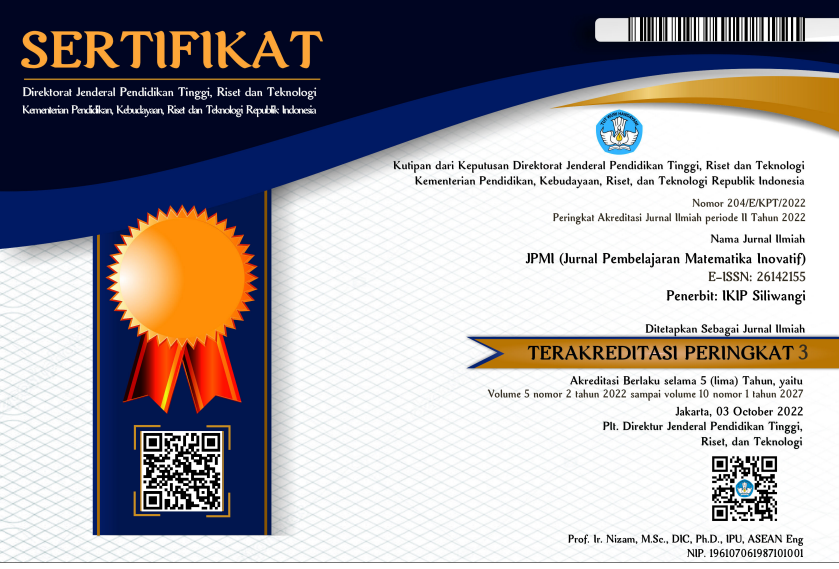PERSEPSI PESERTA DIDIK TERHADAP PEMBELAJARAN BERBASIS DARING
DOI:
https://doi.org/10.22460/jpmi.v3i6.p%25pKeywords:
Perception, Online Learning, Students.Abstract
Online learning is a solution in the era of the COVID-19 pandemic. However, of course, in the implementation, there must be many difficulties for both teachers and students. This study aims to describe students' perceptions of online learning in Lampung Province. Samples were randomly selected using the Slovin Method with a population of Senior High School students in Lampung Province. 400 students from more than 25 schools were chosen for this study. The sample is given a perception questionnaire that has been tested for validity and reliability which is made on Google Form. Based on the research results, it can be concluded that students get good support from various parties in implementing online learning. However, the majority of students experienced problems related to signals during online learning. Many students also have not been able to master the learning application well so that it will affect the learning process. In addition, students stated that they had difficulty communicating with the teacher and preferred to have face-to-face discussions and students had difficulty understanding the material if it only came from books.
References
Ariani, D. (2018). Komponen Pengembangan E-Learning. Jurnal Pembelajaran Inovatif. https://doi.org/10.21009/JPI.011.09
Dewi, P. S., & Septa, H. W. (2019). Peningkatan Kemampuan Pemecahan Masalah dan Disposisi Matematis Siswa dengan Pembelajaran Berbasis Masalah. Mathema, 1(1), 31–39.
Dewi, W. A. F. (2020). Dampak COVID-19 terhadap Implementasi Pembelajaran Daring di Sekolah Dasar. EDUKATIF : JURNAL ILMU PENDIDIKAN. https://doi.org/10.31004/edukatif.v2i1.89
Heggart, K. R., & Yoo, J. (2018). Getting the most from google classroom: A pedagogical framework for tertiary educators. Australian Journal of Teacher Education, 43(3), 140–153. https://doi.org/10.14221/ajte.2018v43n3.9
Hidayat, A., & Sadewa, P. (2020). Pengaruh Penggunaan Aplikasi Eviews Terhadap Sikap Belajar dan Kemampuan Pemecahan Masalah Statistik. Edumaspul: Jurnal Pendidikan, 4(1), 321–328.
Lin, Y. W., Tseng, C. L., & Chiang, P. J. (2017). The effect of blended learning in mathematics course. Eurasia Journal of Mathematics, Science and Technology Education, 13(3), 741–770. https://doi.org/10.12973/eurasia.2017.00641a
Maskar, S., & Wulantina, E. (2019). Persepsi Peserta Didik terhadap Metode Blended Learning dengan Google Classroom. Jurnal Inovasi Matematika, 1(2), 110–121. https://doi.org/10.35438/inomatika.v1i2.156
Menteri Pendidikan dan Kebudayaan. (2020). Surat Edaran Nomor 3 Tahun 2020 Tentang Pencegahan COVID-19 Pada Satuan Pendidikan. Jakarta.
Mustakim. (2020). Efektivitas Pembelajaran Daring Menggunakan Media Online Selama Pandemi Covid-19 Pada Mata Pelajaran Matematika the Effectiveness of E-Learning Using Online Media During the Covid-19 Pandemic in Mathematics. Al Asma: Journal of Islamic Education.
Pavlovic, M., Vugdelija, N., & Kojic, R. (2015). The use of Social Networks for E-Learning Improvement. Hellenic Journal of Music Education, and Culture, 6(3), 13–17.
Puspaningtyas, N. D. (2019). Proses Berpikir Lateral Siswa SD dalam Menyelesaikan Masalah Matematika Open-Ended Ditinjau dari Perbedaan Gaya Belajar. MAJAMATH: Jurnal Matematika Dan Pendidikan Matematika, 2(2), 80–86. https://doi.org/10.36815/majamath.v2i2.373
Rizqi, A. A. (2016). Kemampuan Komunikasi Matematis Siswa melalui Blended Learning Berbasis Pemecahan Masalah. PRISMA, Prosiding Seminar Nasional Matematika.
Santrock, J. W. (2017). Educational Psychology. Michael Sugarman.
Suharsimi, A. (2010). Prosedur Penelitian : Suatu Pendekatan Praktik (Edisi Revisi). Rineka Cipta.
Supriyanto, W., & Iswandari, R. (2017). Kecenderungan Sivitas Akademika dalam Memilih Sumber Referensi untuk Penyusunan Karya Tulis Ilmiah di Perguruan Tinggi. Berkala Ilmu Perpustakaan Dan Informasi, 13(1), 79. https://doi.org/10.22146/bip.26074
Ulfa, M., & Puspaningtyas, N. D. (2020). The Effectiveness of Blended Learning Using A Learning System in Network (SPADA) in Understanding of Mathematical Concept. Matematika Dan Pembelajaran, 8(1), 47–60. https://core.ac.uk/download/pdf/327234460.pdf

















